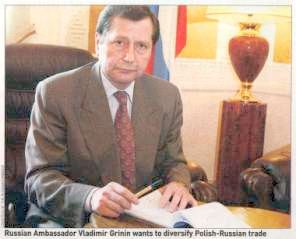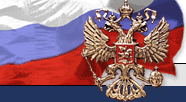Spring thaw
WBJ sits down with Vladimir Grinin, Russian ambassador to Poland, to talk about the thaw in bilateral relations and the potential to improve trade between the two nations

Ewa Boniecka: Political relations between Russia and Poland have returned to their normal status. What brought this about and what has the effect been?
Vladimir Grinin: Relations between two countries are always based on mutual creativity and develop when both sides display good will and the desire to cooperate. Russia and Poland have shared similar approaches toward mutual relations since the end of2007 and beginning of 2008, and we are glad that from that time our relations have been developing progressively.
Polish Prime Minister Donald Tusk's visit to Moscow in February 2008 had a considerable impact on relations. During the talks, both sides agreed to reactivate bilateral cooperation on a pragmatic and non-ideological basis, and to revive such mechanisms as the Intergovernmental Commission for Economic Cooperation, the Commission for Difficult Historical Issues, the Public Forum and others. These agreements are being successfully implemented and quite soon, during Polish Foreign Minister Radoslaw Sikorski's planned [May] visit to Moscow, we will "reset" one more structure - the Strategic Cooperation Committee headed by the respective foreign ministers and comprising high-ranking officials of all the other ministries involved in bilateral interactions.
Have these changes had any effect? By all means. As you correctly mentioned, our relations have returned to their normal flow, which is very important in international practice. However, besides "atmospheric" improvements, there have also been tangible achievements, including the settlement of the problem with deliveries of agricultural products from Poland to Russia, the organization of the "Polish Days" in Russia and arrangements concerning over 100 joint research projects, the settling of a number of technical problems - connected, for example, with the deliveries of additional Russian gas to Poland - and many other issues that would hardly be possible without the improved climate in our relations.
Preparations are being made for Prime Minister Vladimir Putin to visit Poland. Can you confirm this?
To a certain extent. During the meeting in Davos this January, Vladimir Putin accepted Donald Tusk's invitation to visit Poland. However, both prime ministers agreed that such a visit is to be duly prepared.
Both sides are working on it right now. In this context, the aforementioned Strategic Cooperation Committee plays a very important role in this preparation. During the [first] session, committee members will evaluate the level of bilateral interaction in the main spheres: trade, investment, energy, culture, legal and consular matters and many others. The date of the visit depends to a great degree on the results of this assessment.
How would you assess bilateral economic relations? Has the world financial crisis had any impact on them?
Our countries, alongside the international economy, have found themselves a complicated situation. The crisis continues and forecasts are very contradictory. Of course the crisis has had an impact on Russian-Polish economic cooperation.
A rapid decrease in domestic demand in both countries has already caused a shrinking of mutual trade. During the first three quarters of the previous year trade grew rapidly. Thus Poland's share in Russian foreign trade turnover grew to 3.7 percent. This is the highest level during the last 10 years. Poland is Russia's fourth-biggest trade partner in the EU. At the same, time Russia's share in Polish foreign trade reached eight percent, thus Russia remains Poland's second-biggest trade partner after Germany.
However, in November and December 2008 there was a sharp decrease in mutual trade. According to Polish data, our bilateral trade decreased by 15 percent in comparison with the same period of the previous year; according to Russian data these figures were even higher - about 25 percent.
In terms of absolute indices, Russian-Polish turnover (according to Russian data) increased by 51.8 percent in comparison with the previous year and reached the value of $27.2 [zl.90.9] billion. Russian export and import grew similarly and reached $20.2 [zl.67.5] billion and $7.0 [zl.23.4] billion respectively.
It is very difficult to give a well-defined evaluation of our bilateral economic cooperation. If we take into consideration just the numbers, we can state a fact that during the last five years Russian-Polish turnover has increased more than three times over. At first glance the results are striking. However, if we look closer, the situation is less impressive.
In what way?
It seems that our economic ties would be more stable if they were not limited primarily to traditional trade, which is characterized by low diversification of commodity structure and therefore by higher dependence on the state of the world market. There is a lack of cooperation between producers and joint-ventures. As for investment cooperation, it is very low taking into account our mutual turnover, and the possibilities and needs of the Russian and Polish economies.
It is clear that we are facing complicated and, to a certain extent, structural problems that can only be solved together. We are very glad that after a three-year pause we have managed to resume our dialogue within the framework of the Russian-Polish Intergovernmental Commission for Economic Cooperation. The last session took place in Warsaw not long ago. It was mentioned there that in order to reach a better balance in Russian-Polish relations, especially in the time of the crisis, we should continue working on legal issues regarding our cooperation.
One of the major tasks here is to sign a new agreement on encouragement and mutual protection of investments. Generally speaking, we should concentrate on the development of cooperation in the three interrelated spheres: mutual and joint investments, small and medium enterprises, and economic ties between different regions of Russia and Poland.
How does the development of partnership relations between Russia and the European Union influence Russian-Polish bilateral relations?
Russia made its European choice a long time ago and considers the EU its strategic partner. Regarding their political, economic and cultural potential, Russia and the EU are the largest geopolitical formations on the European continent and are very close neighbors. Judging impartially, if we combine our potential and efforts we will have better chances in facing present challenges and threats. In other words, we are destined to close cooperation and interaction.
There is no doubt that the European Union was and is a grouping of 27 [individual] countries. On joining the community they introduced their own understanding and international experience - including relations with Russia - while trying at the same time to absorb each other's experiences and to work out common positions.
We welcome this process of internal unity and consolidation in the European Union. As I have already mentioned, we have linked our future to... this organization. We are very happy that today almost all the members of the EU have given a "green light" to the elaboration of a new basic agreement between Russia and the EU and have thus acknowledged that there is no alternative to the development of partnership relations with Russia.
We have also noted the growing role and influence of Poland in the European Union. This gives us additional possibilities and incentives to keep on strengthening and consolidating the basis of our common European house through the successive improvement of Russian-Polish relations.
| 

